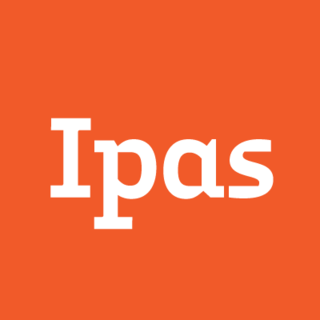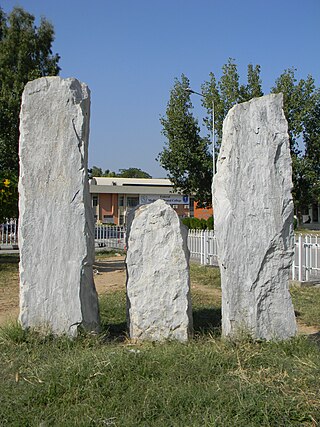
Family planning is the consideration of the number of children a person wishes to have, including the choice to have no children, and the age at which they wish to have them. Things that may play a role on family planning decisions include marital situation, career or work considerations, financial situations. If sexually active, family planning may involve the use of contraception and other techniques to control the timing of reproduction.
The Planned Parenthood Federation of America, Inc. (PPFA), or simply Planned Parenthood, is a nonprofit organization that provides reproductive and sexual healthcare, and sexual education in the United States and globally. It is a tax-exempt corporation under Internal Revenue Code section 501(c)(3) and a member association of the International Planned Parenthood Federation (IPPF).
Reproductive rights are legal rights and freedoms relating to reproduction and reproductive health that vary amongst countries around the world. The World Health Organization defines reproductive rights as follows:
Reproductive rights rest on the recognition of the basic right of all couples and individuals to decide freely and responsibly the number, spacing and timing of their children and to have the information and means to do so, and the right to attain the highest standard of sexual and reproductive health. They also include the right of all to make decisions concerning reproduction free of discrimination, coercion and violence.
The Guttmacher Institute is a research and policy NGO that aims to improve sexual health and expand reproductive rights worldwide. The organization was started in 1968 and functions as both a research and educational organization. It operates mainly in the United States but also focuses on developing countries. Founded as part of Planned Parenthood, the Guttmacher Institute became independent from Planned Parenthood in 2007.

The International Planned Parenthood Federation (IPPF) is a global non-governmental organisation with the broad aims of promoting sexual and reproductive health, and advocating the right of individuals to make their own choices in family planning. It was first formed in 1952 in Bombay, India, by Margaret Sanger and Lady Rama Rau at the Third International Conference on Planned Parenthood with support of an expanding population with limited resources. Presently, it consists of more than 149 Member Associations working in more than 189 countries. The IPPF is highly developed and organised into six regions. The organisation is based in London, England.

EngenderHealth is a 501(c)(3) nonprofit organization based in Washington, D.C. active in sexual and reproductive health (SRH) and operating in nearly 20 countries throughout Africa, Asia, and the Americas.

The healthcare delivery system of Pakistan is complex because it includes healthcare subsystems by federal governments and provincial governments competing with formal and informal private sector healthcare systems. Healthcare is delivered mainly through vertically managed disease-specific mechanisms. The different institutions that are responsible for this include: provincial and district health departments, parastatal organizations, social security institutions, non-governmental organizations (NGOs) and private sector. The country's health sector is also marked by urban-rural disparities in healthcare delivery and an imbalance in the health workforce, with insufficient health managers, nurses, paramedics and skilled birth attendants in the peripheral areas. Pakistan's gross national income per capita in 2021 was $4,990 and the total expenditure on health per capita in 2021 was Rs 657.2 Billions, constituting 1.4% of the country's GDP. The health care delivery system in Pakistan consists of public and private sectors. Under the constitution, health is primarily responsibility of the provincial government, except in the federally administrated areas. Health care delivery has traditionally been jointly administered by the federal and provincial governments with districts mainly responsible for implementation. Service delivery is being organized through preventive, promotive, curative and rehabilitative services. The curative and rehabilitative services are being provided mainly at the secondary and tertiary care facilities. Preventive and promotive services, on the other hand, are mainly provided through various national programs; and community health workers’ interfacing with the communities through primary healthcare facilities and outreach activities. The state provides healthcare through a three-tiered healthcare delivery system and a range of public health interventions. Some government/ semi government organizations like the armed forces, Sui Gas, WAPDA, Railways, Fauji Foundation, Employees Social Security Institution and NUST provide health service to their employees and their dependents through their own system, however, these collectively cover about 10% of the population. The private health sector constitutes a diverse group of doctors, nurses, pharmacists, traditional healers, drug vendors, as well as laboratory technicians, shopkeepers and unqualified practitioners.
Reproductive justice is a critical feminist framework that was invented as a response to United States reproductive politics. The three core values of reproductive justice are the right to have a child, the right to not have a child, and the right to parent a child or children in safe and healthy environments. The framework moves women's reproductive rights past a legal and political debate to incorporate the economic, social, and health factors that impact women's reproductive choices and decision-making ability.

Pakistan as a developing country is struggling in many domains due to which the health system has suffered a lot. As a result of that, Pakistan is ranked 122nd out of 190 countries in the World Health Organization performance report. Pakistan ranks 154th among 195 countries in terms of quality and accessibility of healthcare, according to a Lancet study. According to the study Pakistan has seen improvement in healthcare access and quality since 1990, with its HAQ index increasing from 26.8 in 1990 to 37.6 in 2016. Pakistan per capita income is 4,920 and the total expenditure on health per capita is $129, which is only 2.6% of GDP (2014). The gender inequality in Pakistan is 0.536 and ranks the country 147 out of 188 countries (2004). The total adult literacy rate in Pakistan is 55% (2014) and primary school enrolment is 73%. Life expectancy at birth is 68 years, Pakistan's population is around 185 million out of which more than 70 million people are living below the poverty line. The proportion of population which has access to improved drinking water and sanitation is 91% (2015) and 64% (15) respectively.
Population Action International (PAI) is an international, non-governmental organization that uses research and advocacy to improve global access to family planning and reproductive health care. Its mission is to "ensure that every person has the right and access to sexual and reproductive health, so that humanity and the natural environment can exist in balance with fewer people living in poverty". PAI's headquarters is in Washington, D.C.

Ipas is an international, non-governmental organization that seeks to increase access to safe abortions and contraception. To this end the organization informs women how to obtain safe and legal abortions and trains relevant partners in Africa, Asia, and Latin America on how to provide and advocate for these.

Even though there is considerable demand for family planning in Pakistan, the adoption of family planning has been hampered by government neglect, lack of services and misconceptions. Demographics play a large role in Pakistan's development and security since the recent change from military rule to civilian leadership. Challenges to Pakistani's well-being, opportunities for education and employment, and access to health care are escalated due to the country's continuously-growing population. It was estimated in 2005 that Pakistan's population totaled 151 million; a number which grows 1.9 percent annually, equaling a 2.9 million population growth per year. Though Pakistan's fertility rates still exceed those of neighboring South Asian countries with a total fertility rate at 4.1 and contraception use is lower than 35 percent, approximately one-fourth of Pakistani women wish to either delay the birth of their next child or end childbearing altogether.
Women Deliver is a global advocacy organization that works to generate political commitment and financial investment for fulfilling Millennium Development Goal 5, which is improving maternal health. This is a multifactorial approach, involving access to a healthy diet, clean water and sanitation, health services, and appropriate education during pregnancy and childbirth. Women Deliver is targeted towards reducing maternal mortality, achieving universal access to reproductive health, and improving the lives of girls and women globally.

Founded in 1999, Alliance India is a non-governmental organisation operating in partnership with civil society, government and communities to support sustained responses to HIV in India that protect rights and improve health. Complementing the Indian national programme, we build capacity, provide technical support and advocate to strengthen the delivery of effective, innovative, community-based HIV programmes to vulnerable populations: sex workers, men who have sex with men (MSM), transgender people, hijras, people who inject drugs (PWID), and people living with HIV.
Sexual and reproductive health and rights or SRHR is the concept of human rights applied to sexuality and reproduction. It is a combination of four fields that in some contexts are more or less distinct from each other, but less so or not at all in other contexts. These four fields are sexual health, sexual rights, reproductive health and reproductive rights. In the concept of SRHR, these four fields are treated as separate but inherently intertwined.
Frederick Torgbor Sai, was a Ghanaian academic and family health physician who co-founded the Planned Parenthood Association of Ghana in 1967. A gender and reproductive health advocate, he was known for his campaigns and education drawing attention to the food and nutrition problems of Africa, particularly of women and children. He served as the Chief Physician for Nutrition and the Director of Medical Services at the Ghana Health Service and Professor of Community Health at the University of Ghana, Legon. He was also a nutrition advisor to the Food and Agriculture Organisation, Africa Region as well as the coordinator for the World Hunger Programme of the United Nations University and a Senior Population Advisor to the World Bank. He was the President and Honorary Secretary of the Ghana Academy of Arts and Sciences. In professional circles, he was known as the “Godfather or Father of Family Planning” and sometimes as the “Grandfather of Maternal Health”.
Reach A Hand, Uganda (RAHU) is a youth serving nonprofit organisation based in Uganda that focuses on youth empowerment programs with an emphasis on, Sexual Reproductive Health Rights (SRHR) of young people between the ages of 12–24 years including HIV/AIDS awareness and prevention. RAHU works with the goal of increasing access to information and services relating to SRHR for young people so as to empower them live healthy, focused and productive lives. Reach A Hand Uganda efforts are timely to make a contribution to ensuring that every young person in Uganda can access accurate information to aid and direct them in taking that crucial life decision regarding their life skills and development, behavior change communication and sexual reproductive health and rights.
The Planned Parenthood Association of Ghana(PPAG) is a volunteer-based non-governmental organization affiliated to International Planned Parenthood Federation, established in 1967. It provides Sexual and Reproductive Health (SRH) services in Ghana. PPAG has a team of 103 staff, over 1,000 volunteers, 300 peer educators, 551 community-based distributors (CBDs) and a youth wing call Youth Action Movement(YAM) with 810 membership of young people. PPAG also delivers services and programmes through 1,356 service points, including 11 permanent clinics, 54 mobile clinics and over 1,000 community-based service points (CBSs).
The SisterSong Women of Color Reproductive Justice Collective, also known as SisterSong, is a national activist organization dedicated to reproductive justice for women of color.







